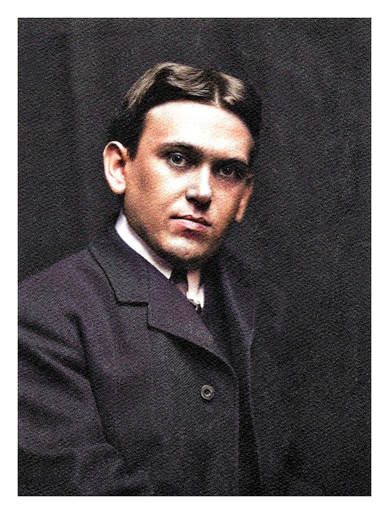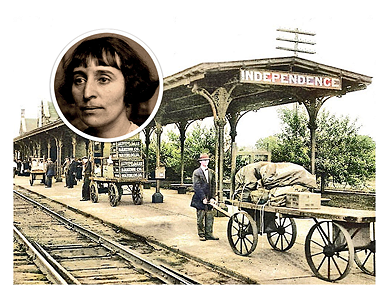Roy R. Behrens, Emeritus Professor of Art at the University of Northern Iowa and Independence native, has released a new 60-minute online documentary film about Iowa expatriate artist William Edwards Cook, and his close long-term friendship with American writer Gertrude Stein…The film is available free online at <https://youtu.be/oph7fCHHHNI>. Other films by Behrens are also online at his YouTube channel at <https://www.youtube.com/channel/UCzYrUfsAvkZur5cBv6xlhSg>.
Thursday, April 21, 2022
Independence, Iowa and William Edwards Cook
Monday, April 11, 2022
blind prejudice / the thing to fear is fear itself
Jay Partridge, A Wonderful Experience: A Memoir. Independence IA: Privately published, no date, p. 29—
Gypsy family, public domain
[Growing up in southern Iowa] I remember only one fear I had when I was a child. It was a fear of Gypsies. Someone said Gypsies steal little boys to work for them. Every year Gypsies would camp over-night, sometimes stay a day or two, at the Mount Vernon school grounds on the corner west of the house.
Their dark skin, black hair and long dark dresses with capes or shawls all scared me. Mom thought their dress was better to hide things they stole. She always tried to keep them out of the house. They were always coming over to get something to eat and feed for their horses.
They traveled in little buildings on wagons pulled by horses. Sometimes there might be five or six loads of them. Seemed like next morning our cows never gave as much milk. The folks always though the Gypsies had come during the night and milked the cows. The folks also thought some chickens, eggs, feed, and maybe a pig were missing after the Gypsies were gone.
Anyway, I breathed easier when they left, because then I knew three little boys they hadn’t stolen.
•••
William L. Shirer, 20th Century Journey. New York: Simon and Schuster, 1976, p. 83—
[While growing up in Cedar Rapids IA] The fear of Indians by the acquisitive white settlers persisted for some time…Sometimes a stray and hungry Indian from the nearby Tama Reservation would come to the back door of our house to beg food and my worried mother would lock the doors and windows and, if the man persisted in knocking, call the police. We were brought up to believe that “the only good Indian was a dead Indian” and nothing was said to us in those days of the cruel and savage slaughter and the robbery of the Indians by the white Americans, one of the darkest sides of our history.
Monday, April 4, 2022
and a handkerchief used for dusting my shoes
Henry L. Mencken, quoted by Huntington Cairns in John Dorsey, ed., On Mencken. New York: Alfred A. Knopf, 1980, pp. 53-54—
[As a youngster in Baltimore, one day, Mencken was "held up by two tough boys and relieved of"] all: five keys, a horse chestnut, the snapper of a buggy whip, a dried cockroach in a pill box, a small shell, six agate marbles, a top, and a handkerchief used mainly for dusting my shoes. I also had two cents, but the bandits, after a long debate, decided not to take them, it would be stealing.
Sunday, April 3, 2022
ham and bacon / let's say eggs for both of them
Richmal Crompton, William’s Treasure Trove. UK: George Newnes Ltd, 1962.
Vintage print advertisement
“I incline to the theory that the plays of Shakespeare were written by Bacon.”
“How could they be?” said William …“How could that man Ham—“
“I said Bacon.”
“Well, it’s nearly the same … Well, if this man Bacon wrote them, they wouldn’t put this man Shakespeare’s name on the books ...”
“Now, boys, I want you all please to listen to me … There was a man called Hamlet—“
“You just said he was called Bacon,” said William.
“I did not say he was called Bacon.”
“Yes, ‘scuse me, you did … When I called him Ham, you said it was Bacon, and now you’re calling him Ham yourself.”
“This was a different man…Listen! This man was called Hamlet and his uncle had killed his father because he wanted to marry his mother.”
“What did he want to marry his mother for?” said William …
“It was Hamlet's mother he wanted to marry.”
“Oh, that man what you think wrote the plays.”
“No, that was Bacon.”
“You said it was Ham a minute ago … I tell you what,” said William confidingly, “let's say Eggs for both of them.”
Saturday, April 2, 2022
Mencken's stolen bible for Louis Untermeyer
Louis Untermeyer, From Another World: The Autobiography of Louis Untermeyer. New York: Harcourt, Brace and Company, 1939, p. 193—
H.L. Mencken, The Baltimore Sun
I was recovering from a touch of grippe when a letter arrived from Henry [Louis Mencken]. It was one of his more medical documents—Henry used to be in and out of Johns Hopkins [medical center] and was continually giving advice to the doctors. He counciled me to get rid of my physician, drink three stiff glasses of Gluhwein, and sleep on a stolen Bible…This, I thought, is another of Henry’s Menckenisms; I laughed and forgot the matter. Two days later, a worn Bible arrived by parcel post. The cover was blazoned in gold: “Property of the Hotel Astor,” and the flyleaf bore this inscription: “To Louis Untermeyer, with the compliments of the Author.”
Friday, April 1, 2022
how be thine graminivorous tramcollicken now?
Edwin Muir, An Autobiography. New York: William Sloane, 1954—
Nature-Themed Poster © Roy R. Behrens 2019
My cousin Sutherland was the most original character in the [his parents’] house. I remember him as a little man in a blue jersey and trousers with a dashing fall. His body swung forward from his hips, as if he were always on the point of offering something with his hands. His head was like a battering-ram, and dusty brown hair like an animal’s fell stood stiffly up from it. His sparkling grey eyes were nautical, his bulbous nose ecclesiastical, his bushy brown moustache military. Before he made a joke he would pass the back of his hand under his moustache with a casual succulent sweep which left his arm negligently hanging in the air, as if he had forgotten it for the moment but would presently remember it again. All his movements melted into each other with the continuity of a tree. His skin was reptilian; his head sloped, like a tortoise’s, into his neck, his shoulders into his trunk. He was very strong and crafty, and in wrestling could bring down men much younger and heavier than himself His ordinary stance then was a lazy crouch; he would roll waggishly on his feet, as if he were keeping his balance in a slight swell; he was very light-footed. His appearance never changed while I knew him; he looked thirty-five all the time.…
Whenever Sutherland got drunk he began to invent language. I can’t remember now many of his feats in this way, but he liked words with a dashing Spanish sound, like ‘yickahooka’ and ‘navahonta.’ He was so pleased with the word ‘tramcollicken,’ which he invented himself, that he gave it a specific meaning which I had better not mention; but the word became so popular that it spread all over Wyre. From somewhere or other he had picked up ‘graminivorous,’ which struck him by its comic sound, and for a long time his usual greeting was, “Weel, boy, how’s thee graminivorous tramcollicken?” Macedonia, Arabia, Valparaiso, and Balaclava became parts of his ordinary vocabulary, giving him a sense of style and grandeur.


